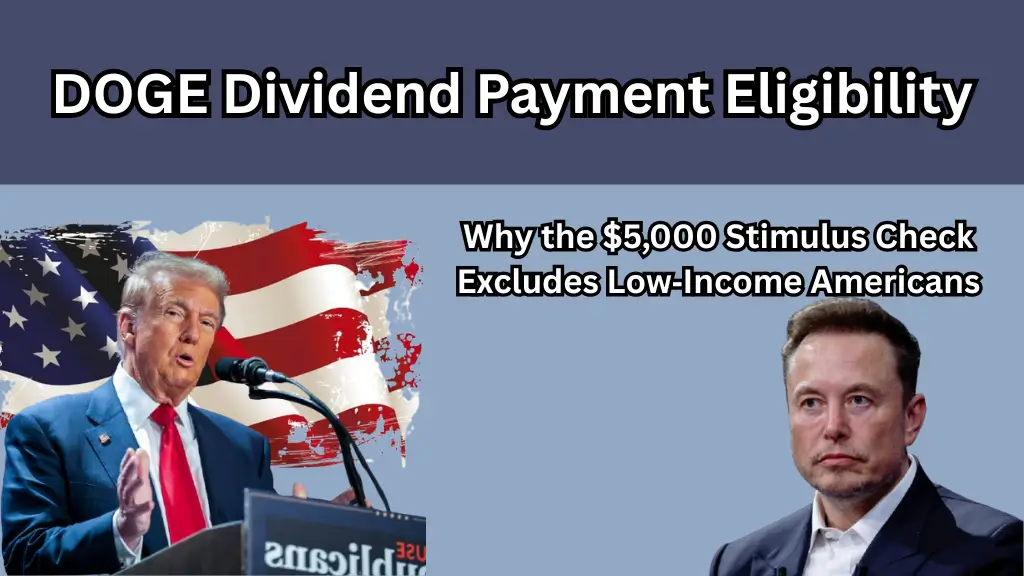The DOGE dividend payment has sparked intense debate: a proposed $5,000 stimulus check funded by the Department of Government Efficiency (DOGE) budget cuts under the Trump administration. Yet, many Americans—especially low-income households—may find themselves ineligible. In this guide, we’ll explore the eligibility criteria, underlying rationale, and what this means for you.

What Is the DOGE Dividend Payment?
The DOGE dividend payment refers to a potential one-time $5,000 check intended to redistribute savings from federal spending cuts. Championed by James Fishback, CEO of investment firm Azoria, this initiative aims to reward taxpayers whose contributions exceed their benefits received from the government.
Why Low-Income Americans Are Excluded
Tax Liability Requirement
- Positive Net Tax Contribution: Only households paying more in federal taxes than they receive in credits and benefits qualify.
- Adjusted Gross Income (AGI) Threshold: Generally, taxpayers with an AGI under $40,000 pay little to no federal income tax, disqualifying them from the DOGE dividend payment.
“Households with low and moderate incomes often receive more in tax credits than they pay in taxes (…) the bottom 50% of earners in the US pay approximately 3% of the total individual income taxes collected by the IRS.”
— Tax Foundation1
Implications for SNAP and Social Security Recipients
Many SNAP beneficiaries and Social Security recipients rely on refundable credits, further reducing their net tax liability below the eligibility threshold. As a result, the very populations that need stimulus support most are left out.
Current Status: Pending Congressional Approval
As of now, Congress has not passed the DOGE dividend payment proposal. While federal spending cuts are projected to save around $2 trillion, the timeline for approval—and distribution—remains uncertain. Keep an eye on updates:
- Florida SNAP Payment Dates: Some SNAP recipients will see April 2025 benefits in the second week of April.
- Social Security Identity Proofing: Policy changes have been delayed; a new effective date is pending after stakeholder feedback.
Expert Insights
James Fishback’s Perspective
Fishback argues that rewarding net contributors strengthens fiscal responsibility and incentivizes tax compliance. However, critics warn this approach overlooks economic equity and poverty alleviation goals.
Alternative Stimulus Proposals
- Universal Basic Income (UBI): Advocates suggest a flat payment to all citizens, regardless of income or tax status.
- Targeted Relief for Vulnerable Groups: Proposals include expanded refundable tax credits or direct support for low‑income families.
Is It a Good Time to Buy a House?
With potential budget cuts and stimulus uncertainty, the housing market may see fluctuating mortgage rates. Consider:
- Current Interest Rates: Track Fed announcements for rate trends.
- Local Market Conditions: Consult real estate professionals or use tools like Zillow’s mortgage calculator for personalized estimates.
- Personal Financial Health: Ensure stable income and emergency savings before committing to a mortgage.
What You Can Do Now
- Check Your Tax Records: Verify your net tax contribution via IRS transcripts.
- Stay Informed: Follow reputable news outlets and official government releases.
- Plan Finances: Build emergency savings and reduce high‑interest debt.
- Consult a Tax Professional: Get personalized advice on maximizing credits and deductions.
External Resources
- IRS Official Website: Detailed tax transcripts and AGI verification.
- Tax Foundation: In-depth analysis of tax burden distribution.
- Congress.gov: Track the status of the DOGE dividend payment proposal.
Conclusion
The DOGE dividend payment proposal highlights a key tension in fiscal policy: rewarding net taxpayers versus supporting low‑income Americans. While a $5,000 stimulus check sounds appealing, strict eligibility rules mean many households won’t qualify. Stay proactive—monitor legislative updates, optimize your tax situation, and explore alternative relief programs to navigate these uncertain times.